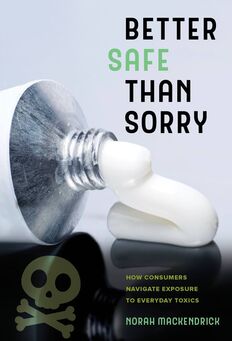
How toxic are the products we consume on a daily basis? Whether it’s triclosan in toothpaste, formaldehyde in baby shampoo, endocrine disruptors in water bottles, or pesticides on strawberries, chemicals in food and personal care products are of increasing concern to consumers. This book chronicles how ordinary people try to avoid exposure to toxics in grocery store aisles using the practice of “precautionary consumption.”
Through an innovative analysis of environmental regulation, the advocacy work of environmental health groups, the expansion of the health-food chain Whole Foods Market, and interviews with consumers, Norah MacKendrick ponders why the problem of toxics in the U.S. retail landscape has been left to individual shoppers—and to mothers in particular. She reveals how precautionary consumption, or “green shopping,” is a costly and time-intensive practice, one that is connected to cultural ideas of femininity and good motherhood but is also most available to upper- and middle-class households. Better Safe Than Sorry powerfully argues that precautionary consumption places a heavy and unfair burden of labor on women and does little to advance environmental justice or mitigate risk.
*Winner of the Allan Schnaiberg Outstanding Publication Award (American Sociological Association)*
*Winner of the First Book Award (Association for the Study of Food and Society)*
Available at UC Press, Amazon, Barnes & Noble, and independent bookstores.
REVIEWS
“Better Safe Than Sorry takes on the timely question of how consumers understand and make decisions about the daily chemical exposures we face. Weaving together a rich explanation of the complex evolution of chemical regulation with an empathetic exploration of individual collective strategies to mitigate risk, Norah MacKendrick makes an important contribution to our understanding of this significant issue, which lies at the intersection of science, environmentalism, parenting, corporations, and public health.”—Jennifer A. Reich, author of Calling the Shots: Why Parents Reject Vaccines
“This is a unique examination of policy and regulation, the environmental health movement, and corporate and individual responses to chemical contamination in food and personal care products. It’s a fresh look at hoBuyw people put excessive effort into reading labels and buying products that provide them with less toxic exposure and healthier lives, while the corporate structure is so powerful and the regulatory framework so weak that individual efforts are never enough. MacKendrick weaves together environmental sociology, gender studies, popular culture, environmental studies, and social movements while highlighting the centrality of gender in ‘precautionary consumption.’“—Phil Brown, author of Toxic Exposures: Contested Illnesses and the Environmental Health Movement
“MacKendrick proves why the supermarket, the pantry, and even the label on your lotion are objects of sociological investigation as critical and consequential as the street corner, the newsstand, and the operating room. This book is growing more relevant, more urgent by the minute.”—Rebecca Altman, writer and sociologist
“Well researched and beautifully written, Better Safe Than Sorry shows how ‘precautionary consumption’ is a logical but inadequate response to a regulatory system that has failed consumers and the environment. By showing how strategies like reading labels and choosing ecofriendly products perpetuate inequalities, this book makes critical contributions to our understanding of consumption, risk, and environmental regulation.”—Sarah Bowen, author of Divided Spirits: Tequila, Mezcal, and the Politics of Production
Through an innovative analysis of environmental regulation, the advocacy work of environmental health groups, the expansion of the health-food chain Whole Foods Market, and interviews with consumers, Norah MacKendrick ponders why the problem of toxics in the U.S. retail landscape has been left to individual shoppers—and to mothers in particular. She reveals how precautionary consumption, or “green shopping,” is a costly and time-intensive practice, one that is connected to cultural ideas of femininity and good motherhood but is also most available to upper- and middle-class households. Better Safe Than Sorry powerfully argues that precautionary consumption places a heavy and unfair burden of labor on women and does little to advance environmental justice or mitigate risk.
*Winner of the Allan Schnaiberg Outstanding Publication Award (American Sociological Association)*
*Winner of the First Book Award (Association for the Study of Food and Society)*
Available at UC Press, Amazon, Barnes & Noble, and independent bookstores.
REVIEWS
“Better Safe Than Sorry takes on the timely question of how consumers understand and make decisions about the daily chemical exposures we face. Weaving together a rich explanation of the complex evolution of chemical regulation with an empathetic exploration of individual collective strategies to mitigate risk, Norah MacKendrick makes an important contribution to our understanding of this significant issue, which lies at the intersection of science, environmentalism, parenting, corporations, and public health.”—Jennifer A. Reich, author of Calling the Shots: Why Parents Reject Vaccines
“This is a unique examination of policy and regulation, the environmental health movement, and corporate and individual responses to chemical contamination in food and personal care products. It’s a fresh look at hoBuyw people put excessive effort into reading labels and buying products that provide them with less toxic exposure and healthier lives, while the corporate structure is so powerful and the regulatory framework so weak that individual efforts are never enough. MacKendrick weaves together environmental sociology, gender studies, popular culture, environmental studies, and social movements while highlighting the centrality of gender in ‘precautionary consumption.’“—Phil Brown, author of Toxic Exposures: Contested Illnesses and the Environmental Health Movement
“MacKendrick proves why the supermarket, the pantry, and even the label on your lotion are objects of sociological investigation as critical and consequential as the street corner, the newsstand, and the operating room. This book is growing more relevant, more urgent by the minute.”—Rebecca Altman, writer and sociologist
“Well researched and beautifully written, Better Safe Than Sorry shows how ‘precautionary consumption’ is a logical but inadequate response to a regulatory system that has failed consumers and the environment. By showing how strategies like reading labels and choosing ecofriendly products perpetuate inequalities, this book makes critical contributions to our understanding of consumption, risk, and environmental regulation.”—Sarah Bowen, author of Divided Spirits: Tequila, Mezcal, and the Politics of Production
